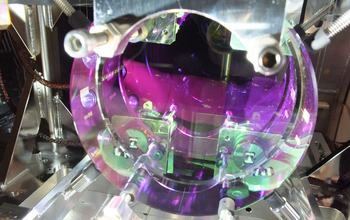
Media Advisory 19-002
NSF and UKRI host conversation on future directions for LIGO research
February 12, 2019
Media invited to expert panel discussing next generation gravitational wave detector
NSF and UKRI to host conversation on future directions for LIGO research
Media are invited to attend an expert panel discussion on gravitational wave detectors and the future of the Laser Interferometer Gravitational-wave Observatory (LIGO) at the Marriott Wardman Park hotel on Feb. 14. The National Science Foundation (NSF) and U.K. Research and Innovation (UKRI) will host the panel discussion and make an announcement related to the future of the LIGO detectors. LIGO made the historic discovery of gravitational waves in 2015 and its creators were awarded the 2017 Nobel Prize for physics.
What: Expert panel discussion on LIGO and next generation gravitational wave detection
Who:
- Barry Barish, Linde Professor of Physics, emeritus Caltech, distinguished professor at the University of California, Riverside, and Nobel Laureate “for decisive contributions to the LIGO detector and the observation of gravitational waves.”
- Martin Hendry, professor of gravitational astrophysics and cosmology at the University of Glasgow and chair of the LIGO Education and Public Outreach group.
- Mike Zucker,senior physicist, Caltech and MIT LIGO Laboratory.
When: Thursday, Feb. 14, 2019, 1:00 p.m. to 1:45 p.m. ET (Doors open at 12:55 p.m. ET)
Where: Marriott Wardman Park, 2660 Woodley Road NW, Washington, D.C. 20008, Conference Room 8212.
RSVP: Space is limited. Registration will be on a first-come-first-serve basis. Please RSVP to Ben Seiden at Ben.Seiden@fco.gov.uk or Josh Chamot at jchamot@nsf.gov.
Panelists will discuss the future of the LIGO detectors and take questions from the media. The LIGO announcement will be under embargo until that evening at 7:00 p.m. ET.
-NSF-
Media Contacts
Joshua Chamot, NSF, 703-292-4489, email: jchamot@nsf.gov
The U.S. National Science Foundation propels the nation forward by advancing fundamental research in all fields of science and engineering. NSF supports research and people by providing facilities, instruments and funding to support their ingenuity and sustain the U.S. as a global leader in research and innovation. With a fiscal year 2020 budget of $8.3 billion, NSF funds reach all 50 states through grants to nearly 2,000 colleges, universities and institutions. Each year, NSF receives more than 40,000 competitive proposals and makes about 11,000 new awards. Those awards include support for cooperative research with industry, Arctic and Antarctic research and operations, and U.S. participation in international scientific efforts.
![]() Get News Updates by Email
Get News Updates by Email
Connect with us online
NSF website: nsf.gov
NSF News: nsf.gov/news
For News Media: nsf.gov/news/newsroom
Statistics: nsf.gov/statistics/
Awards database: nsf.gov/awardsearch/
Follow us on social
Twitter: twitter.com/NSF and twitter.com/NSFspox
Facebook: facebook.com/US.NSF />
Instagram: instagram.com/nsfgov
Source: NSF News
Brought to you by China News







